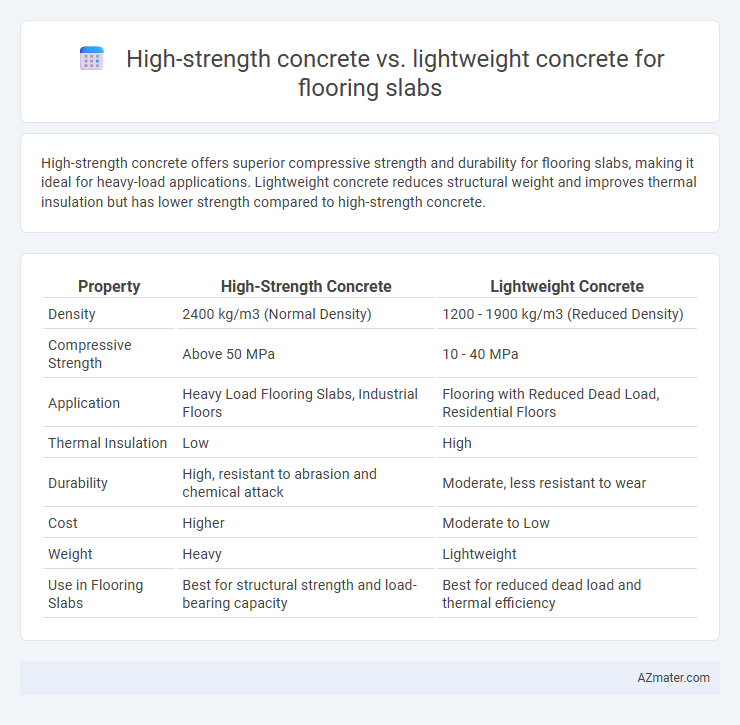High-strength concrete offers superior compressive strength and durability for flooring slabs, making it ideal for heavy-load applications. Lightweight concrete reduces structural weight and improves thermal insulation but has lower strength compared to high-strength concrete.
Table of Comparison
| Property | High-Strength Concrete | Lightweight Concrete |
|---|---|---|
| Density | 2400 kg/m3 (Normal Density) | 1200 - 1900 kg/m3 (Reduced Density) |
| Compressive Strength | Above 50 MPa | 10 - 40 MPa |
| Application | Heavy Load Flooring Slabs, Industrial Floors | Flooring with Reduced Dead Load, Residential Floors |
| Thermal Insulation | Low | High |
| Durability | High, resistant to abrasion and chemical attack | Moderate, less resistant to wear |
| Cost | Higher | Moderate to Low |
| Weight | Heavy | Lightweight |
| Use in Flooring Slabs | Best for structural strength and load-bearing capacity | Best for reduced dead load and thermal efficiency |
Introduction to Flooring Slab Concrete Types
Flooring slabs require specific concrete types to meet load-bearing and durability demands. High-strength concrete offers superior compressive strength, making it ideal for heavy traffic and industrial flooring applications. Lightweight concrete reduces structural load and improves thermal insulation, benefiting residential and multistory building floors where weight savings and energy efficiency are critical.
Composition of High-Strength Concrete
High-strength concrete for flooring slabs is composed of a low water-to-cement ratio, typically below 0.35, combined with high-quality cement, fine aggregates, and supplementary cementitious materials like silica fume or fly ash to enhance durability and compressive strength exceeding 6000 psi. The mixture often includes superplasticizers to improve workability without increasing water content, ensuring a dense and compact microstructure. This optimized composition provides superior load-bearing capacity and resistance to abrasion compared to lightweight concrete, which prioritizes reduced density through the inclusion of lightweight aggregates.
Composition of Lightweight Concrete
Lightweight concrete for flooring slabs is composed of cement, water, fine and coarse lightweight aggregates such as expanded clay, shale, or pumice, and often includes air-entraining agents to enhance durability and insulation properties. This mixture reduces the overall density to 1,600 to 1,850 kg/m3, significantly lower than high-strength concrete which typically has a density of 2,400 kg/m3 and uses normal-weight aggregates like crushed stone. The porous structure of lightweight aggregates improves thermal insulation and reduces dead load, making it ideal for flooring slabs in multi-story buildings where weight reduction is critical.
Mechanical Properties and Performance
High-strength concrete exhibits superior compressive strength typically exceeding 50 MPa, making it ideal for flooring slabs requiring high load-bearing capacity and durability under heavy traffic conditions. Lightweight concrete, with density ranging from 1600 to 2000 kg/m3, offers reduced dead load and improved thermal insulation, but its compressive strength generally varies between 17 to 40 MPa, affecting its suitability for high-stress slab applications. Mechanical properties such as modulus of elasticity and flexural strength are notably higher in high-strength concrete, enhancing slab stiffness and resistance to cracking compared to lightweight alternatives.
Structural Weight Considerations
High-strength concrete offers superior load-bearing capacity for flooring slabs while typically increasing structural weight due to its higher density, often ranging from 2400 to 2500 kg/m3. Lightweight concrete significantly reduces the slab's dead load, with densities between 1600 and 1900 kg/m3, enhancing structural efficiency and reducing foundation requirements. Selecting lightweight concrete minimizes seismic forces and deflection in multistory buildings, optimizing structural performance without compromising strength for standard flooring load demands.
Load-Bearing Capacities
High-strength concrete exhibits superior load-bearing capacities for flooring slabs due to its increased compressive strength, typically exceeding 6000 psi, making it ideal for industrial and commercial applications requiring heavy load support. Lightweight concrete, with densities ranging from 90 to 115 lb/ft3, offers reduced weight that minimizes dead loads but has lower compressive strength, generally between 2500 and 5000 psi, limiting its use in heavily loaded structures. Engineers often select high-strength concrete when structural integrity and heavy load resistance are critical, whereas lightweight concrete suits applications emphasizing weight reduction and thermal insulation.
Thermal and Acoustic Insulation Comparison
High-strength concrete offers superior load-bearing capacity but tends to have higher thermal conductivity, resulting in less effective thermal insulation for flooring slabs compared to lightweight concrete. Lightweight concrete, often incorporating expanded aggregates or aerated materials, provides enhanced thermal and acoustic insulation properties due to its lower density and increased porosity, which reduce heat transfer and absorb sound vibrations more efficiently. Selecting lightweight concrete for flooring slabs can significantly improve energy efficiency and indoor acoustics in residential and commercial buildings.
Installation and Workability Differences
High-strength concrete offers superior load-bearing capacity and durability for flooring slabs but tends to have lower workability, requiring additional admixtures or mechanical vibration for proper installation. Lightweight concrete provides easier handling and faster placement due to its reduced weight and improved workability, though it may require careful curing to achieve optimal strength. Installation processes differ significantly, with high-strength concrete demanding precise mixing and compaction, while lightweight concrete benefits from reduced labor intensity and quicker finishing times.
Cost Implications and Economic Feasibility
High-strength concrete offers greater durability and load-bearing capacity for flooring slabs but comes at a higher material cost due to increased cement content and additives. Lightweight concrete reduces dead load and lowers transportation and labor expenses, making it economically feasible for large-scale projects or buildings with weight restrictions. Evaluating total lifecycle costs, including installation and maintenance, is crucial for selecting the optimal solution based on budget constraints and structural requirements.
Application Suitability for Various Projects
High-strength concrete is ideal for flooring slabs in industrial and commercial projects requiring superior load-bearing capacity and durability, supporting heavy machinery and high traffic loads. Lightweight concrete offers excellent thermal insulation and reduced dead load, making it suitable for residential buildings and structures where weight reduction is critical. Selecting between the two depends on project-specific demands like structural load, energy efficiency, and cost-effectiveness.

Infographic: High-strength concrete vs Lightweight concrete for Flooring slab
 azmater.com
azmater.com